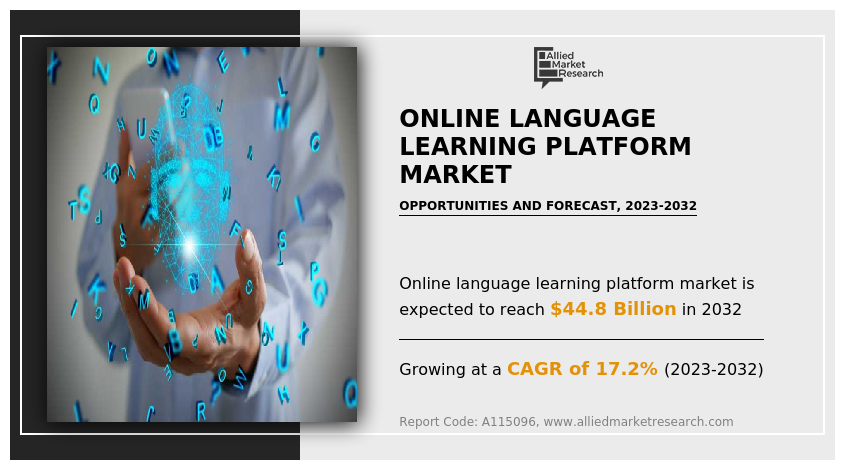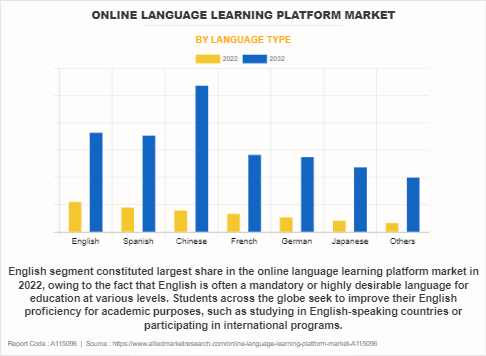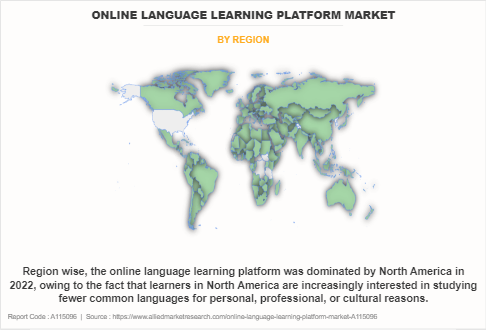Online Language Learning Platform Market Overview
The global online language learning platform market was valued at USD 9.3 billion in 2022, and is projected to reach USD 44.8 billion by 2032, growing at a CAGR of 17.2% from 2023 to 2032.
The market is fueled by increase in cross-cultural interactions and demand for language proficiency. In addition, convenience and flexibility offered by online platforms cater to learners' diverse schedules, making language acquisition more accessible. Furthermore, rise in the awareness of language skills as valuable assets in the professional landscape enhances the online language learning platform market growth, especially for career-oriented individuals. Thus, these factors notably contribute toward the growth of market.

Introduction
Online language learning platform is an internet-based platform for language acquisition serves as a digital environment that is specifically created to enable the development of linguistic abilities through the utilization of virtual resources and interactive instruments. Such platforms offer a diverse array of courses encompassing various languages, thereby granting users the autonomy to learn at their own pace and convenience. Typically, these platforms are accessed through web browsers or dedicated applications, and they furnish a wide range of educational materials, which include video lessons, audio recordings, written exercises, and quizzes. Users get engaged in language learning from anywhere with an internet connection, making it flexible for diverse schedules.
In addition, some platforms incorporate features such as discussion forums, live tutoring sessions, and progress tracking tools to enhance the learning experience. With the increasing demand for language skills in a globalized world, online language learning platforms serve as accessible and effective tools for individuals seeking to acquire proficiency in a new language.
However, concerns about the quality & authenticity of online language courses, and lack of standardized evaluation methods is limiting the expansion of online language learning platform market. On the contrary, continuous advancement of multimedia technologies offers opportunities for innovative content delivery, including virtual language immersion experiences and multimedia-rich resources. Furthermore, ongoing need for language skills in an evolving global landscape is expected to create lucrative opportunities for market in the upcoming years.
The report focuses on growth prospects, restraints, and trends of the market forecast. The study provides Porter five forces analysis to understand the impact of various factors such as the bargaining power of suppliers, competitive rivalry, threat of new entrants, threat of substitutes, and bargaining power of buyers on the market outlook. The online language learning platform market is segmented into Mode, Language Type and End User.
Segment Review
The market is segmented into mode, language type, end user, and region. On the basis of mode, it is categorized into digital self-tutoring. Depending on language type, the market is classified into English, Spanish, Chinese, French, German, Japanese, and Others. According to end user, it is divided into educational institutions and individuals. On the basis of region, the market is analyzed across North America, Europe, Asia-Pacific, and LAMEA.

By language type, the English segment acquired a major online language learning platform market size in 2022. The is attributed to the fact that English is often a mandatory or highly desirable language for education at various levels. Students across the globe seek to improve their E proficiency for academic purposes, such as studying in English-speaking countries or participating in international programs.

By region, North America dominated the online language learning platform market share in 2022. This is attributed to the fact that many online language learning platforms in North America are catering to professionals seeking language skills for business purposes. This trend reflects the importance of language proficiency in an increasingly globalized business environment.
Key Market Players
Online language learning platform key players such as Rosetta Stone LLC, Babbel GmbH, Speexx, Sanako, Busuu Ltd, Berlitz Corporation, Memrise, ELSA, Inlingua International Ltd., and Transparent Language, Inc. These players have adopted various strategies to increase their market penetration and strengthen their position in the market.
Top Impacting Factors
Growing Demand for Online Learning
The global shift toward online education has led to rise in demand for online language learning platforms. Individuals prefer the flexibility and convenience of learning languages from the comfort of their homes. Furthermore, language learning platforms have been expanding their course offerings to include a wide range of languages beyond the commonly taught ones. This trend is driven by rise in the interest in learning fewer mainstream languages for personal, professional, or travel-related reasons. In addition, use of mobile applications for language learning has been on the rise. Users appreciate the flexibility of learning languages on their smartphones or tablets, making it easy to integrate language learning into their daily routines.
Furthermore, the corporate sector is recognizing the importance of language proficiency in a globalized business environment. Many platforms are expanding their services to offer corporate training programs, catering to the language needs of employees. Moreover, platforms are increasingly incorporating adaptive learning technologies to tailor lessons based on individual learner progress and preferences. This personalization enhances the efficiency of language acquisition by focusing on areas where learners need improvement. Thus, growing demand for online learning is propelling the growth of online language learning platform industry.
Rising Need for Cross-border Communication
The increasing globalization of businesses and interconnectedness of economies have created a demand for language learning platforms that cater to professionals needing to communicate across borders. This trend is particularly relevant for industries such as finance, healthcare, and technology. Furthermore, there is a growing trend toward industry-specific language training. Professionals in fields such as medicine, law, and engineering seek language learning platforms that offer specialized courses tailored to the vocabulary and communication requirements of their respective industries. Learners are showing an increased interest in understanding cultural nuances and communication styles. Language learning platforms are incorporating cultural competence training to prepare users for diverse international interactions.
Moreover, language learning platforms are exploring ways to integrate with professional networking platforms. This allows learners to connect with language speakers and practitioners in their respective industries, facilitating authentic cross-border communication experiences. Thus, surge in need for cross-border communication is boosting the growth of the online language learning platform industry.
Integration of AI in Online Language Learning Platform
AI is used to analyze learner data and behaviors, enabling the creation of personalized learning paths. These paths are tailored to individual strengths, weaknesses, and learning styles, optimizing the effectiveness of language acquisition. In addition, NLP technology is employed for improved language understanding and processing. It enables more natural interactions between users and the learning platform, including voice recognition, chatbots, and language generation exercises. Further, AI-powered speech recognition technology helps learners improve pronunciation by providing real-time feedback. This feature assists users in refining their speaking skills and ensures accurate pronunciation. Language learning platforms integrate AI-driven chatbots to offer conversational practice. In addition, learners engage in dialogues with virtual characters, improving their conversational skills in a simulated environment.
Furthermore, AI-powered predictive text and autocorrection features assist learners in writing exercises. This ensures that learners receive immediate corrections and suggestions for improving their written language skills. AI analyze a learner's proficiency in one language to identify transferable skills that aid in learning another language. This approach leverages existing language knowledge to expedite the learning process for additional languages. Thus, integration of AI in online language learning platforms is driving the growth of the online language learning platform industry.
Market Trends and Landscape
Increase in products launched to enhance online language learning platform and adoption of the advance technologies are some of the trends flourishing the online language learning platform market growth. For instance, in September 2020, GoLearn, an Indian English language teaching & learning (ELTL) platform powered by AI was launched that aligned with IGCSE, IG, CBSE, ICSE, and State Board curricula, CEFR & PISA standards, and the Indian National Education Policy (NEP) 2020. It worked using AI and evidenced pedagogies, and is underpinned by Bloom and SOLO taxonomies, to ensure a high-quality & skills-based education is accessible & achievable for every student in India.
Furthermore, increase in partnerships in the market by key players is expected to boost the growth of the online language learning platform market during the forecast period. For instance, in August 2023, Language Confidence, a provider of language assessment solutions, announced its strategic partnership with Learnosity, a leader in assessment solutions that's advancing education and learning globally with best-in-class technology. This collaboration aimed to revolutionize language learning and assessment by integrating Language Confidence's advanced APIs for automated speech assessment directly into the Learnosity assessment engine.
The COVID-19 pandemic has positively impacted the market. With lockdowns and social distancing measures in place globally, traditional language learning methods faced disruptions, leading to surge in demand for online language learning platform platforms. The closure of physical language schools forced learners to seek alternative ways to enhance their language skills from the safety of their homes. This increased demand resulted in the rapid growth of the online language learning platform market. Students, professionals, and language enthusiasts turned to digital platforms that offered a variety of courses and interactive learning experiences. The flexibility and accessibility of online language learning platforms became crucial during the pandemic, allowing individuals to continue their language education despite the global crisis.
Key Industry Development
Recent Partnerships in Market
In December 2021, Rosetta Stone, a leading language learning brand, and HIAS, the international Jewish humanitarian organization, have extended their partnership to provide HIAS' refugee clients with free language learning software. Through the collaboration, Rosetta Stone donated 500 subscriptions that help newly resettled refugees acquire language skills, more easily integrate into local communities, and open pathways to economic inclusion.
In November 2023, the FSC Indigenous Foundation, a global indigenous organization working with and for indigenous people globally, and Babbel, a leading language learning platform, announced a partnership to offer English lessons to indigenous people across the globe. Babbel is expected to support indigenous people with the self-paced learning app and its live classes with teachers to learn English, so they actively participate in international events and meetings and get access to more opportunities for the benefit of their communities and the planet. English makes it easier for them to find information on activities that improve their lives and territories.
Recent Acquisition in Market
In April 2022, Pearson, a leading learning company, announced the acquisition of Mondly, a global online language learning platform. The acquisition is expected to allow Pearson to offer a full range of ways for people to learn and prove their English skills adding online self-study to its existing diagnosis and learning tools & assessment portfolio.
In September 2023, Babbel announced the acquisition of the Toucan browser extension. Toucan has developed a browser extension that allows language learners to practice new vocabulary while browsing the internet, automatically translating certain words and phrases on the page into one of eleven languages. The browser extension ultimately becomes part of Babbel ecosystem.
Key Benefits for Stakeholders
This report provides a quantitative analysis of the market segments, current trends, estimations, and dynamics of the market analysis from 2022 to 2032 to identify the prevailing online language learning platform market share.
The market research is offered along with information related to key drivers, restraints, and opportunities.
Porter's five forces analysis highlights the potency of buyers and suppliers to enable stakeholders to make profit-oriented business decisions and strengthen their supplier-buyer network.
An in-depth analysis of the online language learning platform market size segmentation assists to determine the prevailing market opportunity.
Major countries in each region are mapped according to their revenue contribution to the global market.
Market player positioning facilitates benchmarking and provides a clear understanding of the present position of the market players.
The report includes the analysis of the regional and global online language learning platform market trends, key players, market segments, application areas, and market growth strategies.
Online Language Learning Platform Market Report Highlights
| Aspects | Details |
| Market Size By 2032 | USD 44.8 billion |
| Growth Rate | CAGR of 17.2% |
| Forecast period | 2022 - 2032 |
| Report Pages | 268 |
| By Mode |
|
| By Language Type |
|
| By End User |
|
| By Region |
|
| Key Market Players | Transparent Language, Inc., ELSA, Rosetta Stone LLC, Busuu Ltd., Memrise, Berlitz Corporation, Sanako, Inlingua International Ltd., Babbel GmbH, Speexx |
Analyst Review
The integration of AI technologies enhances personalized learning experiences, providing adaptive content, and individualized feedback. In addition, microlearning is gaining traction, breaking down lessons into bite-sized modules for quick and convenient study sessions. Social learning features, including discussion forums and language exchange opportunities, foster collaborative learning experiences. Further, gamification elements, such as badges & rewards, boost engagement and motivation. Virtual reality (VR) and augmented reality (AR) technologies are emerging, offering immersive language learning environments. In addition, niche language courses and cultural context integration cater to specific learner needs. Furthermore, demand for real-world language skills emphasizes conversational proficiency and practical applications. Mobile learning continues to rise, allowing users to access language courses on-the-go through smartphones and tablets, reflecting the evolving landscape of online language education.
The key market players are adopting strategies such as product launch to enhance their services in the market and improve customer satisfaction. For instance, in June 2021, Memrise, the language-learning platform, launched a series of immersive lessons that combine language learning with music, based on popular billboard songs globally. Its new lessons allow users to learn the lyrics to popular songs across the globe through immersive videos featuring native speakers, music videos, and flashcards. With these lessons, users kickstart their learning journey by engaging in the universal language of music.
The global online language learning platform market was valued at USD 9.3 billion in 2022, and is projected to reach USD 44.8 billion by 2032
The online language learning platform market is estimated to grow at a CAGR of 17.2% from 2023 to 2032 to reach USD 44.8 billion by 2032
The key players profiled in the report include such as Rosetta Stone LLC, Babbel GmbH, Speexx, Sanako, Busuu Ltd, Berlitz Corporation, Memrise, ELSA, Inlingua International Ltd., and Transparent Language, Inc.
Growing demand for online learning, rising need for cross-border communication, and integration of AI in online language learning platform majorly drive the growth of the market.
North America held the highest market share in terms of revenue in 2022
Loading Table Of Content...
Loading Research Methodology...



